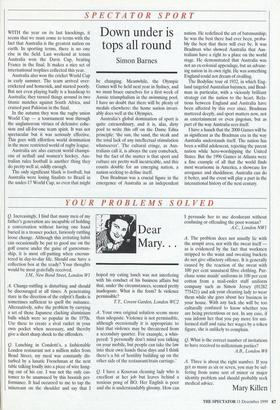SPECTATOR SPORT
Down under is tops all round
Simon Barnes
WITH the year on its last knockings, it seems that we must come to terms with the fact that Australia is the greatest nation on earth. In sporting terms, there is no one else in the field. Last weekend at tennis Australia won the Davis Cup, beating France in the final. It makes a nice set of international trophies collected this year. Australia also won the cricket World Cup in early summer. The team arrived over- cricketed and homesick, and started poorly. But not even playing badly is a handicap to Australia; they turned things around in two titanic matches against South Africa, and cruised past Pakistan in the final.
In the autumn they won the rugby union World Cup — a tournament won through the unglamorous virtues of defensive cohe- sion and all-for-one team spirit. It was not spectacular but it was seriously effective. This goes with effortless world domination in the more restricted world of rugby league. Australia are also current world champi- ons of netball and women's hockey. Aus- tralian rules football is another thing they do pretty well at, oddly enough.
The only significant blank is football, but Australia were losing finalists to Brazil in the under-17 World Cup, so even that might be changing. Meanwhile, the Olympic Games will be held next year in Sydney, and we must brace ourselves for a first week of Aussie triumphalism in the swimming pool. I have no doubt that there will be plenty of medals elsewhere: the home nation invari- ably does well at the Olympics.
Australia's global domination of sport is quite extraordinary, and it is, alas, dirty pool to write this off on the Dame Edna principle: the sun, the sand, the steak and the total lack of any intellectual stimulation whatsoever'. The cultural cringe, as Aus- tralians call it, is always the easy comeback, but the fact of the matter is that sport and culture are pretty well inextricable, and this counts double for an emerging nation, a nation seeking to define itself.
Don Bradman was a crucial figure in the emergence of Australia as an independent nation. He redefined the art of batsmanship; he was the best there had ever been, proba- bly the best that there will ever be. It was Bradman who showed Australia that Aus- tralians have a right to a place on the world stage. He demonstrated that Australia was not an ex-colonial appendage, but an advanc- ing nation in its own right. He was something England could not dream of rivalling.
The Bodyline tour of 1932, in which Eng- land targeted Australian batsmen, and Brad- man in particular, with a viciously brilliant strategy cut the nation to the heart. Rela- tions between England and Australia have been affected by this ever since. Bradman mattered deeply, and sport matters now, not as entertainment or even jingoism, but as part of the way Australia sees itself.
I have a hunch that the 2000 Games will be as significant as the Bradman era in the way Australia understands itself. The nation has been a wilful adolescent, rejecting the parent nation while hero-worshipping the United States. But the 1996 Games in Atlanta were a fine example of all that the world finds most wearisome in America, a showcase for arrogance and shoddiness. Australia can do it better, and the event will play a part in the international history of the next century.


























































































 Previous page
Previous page